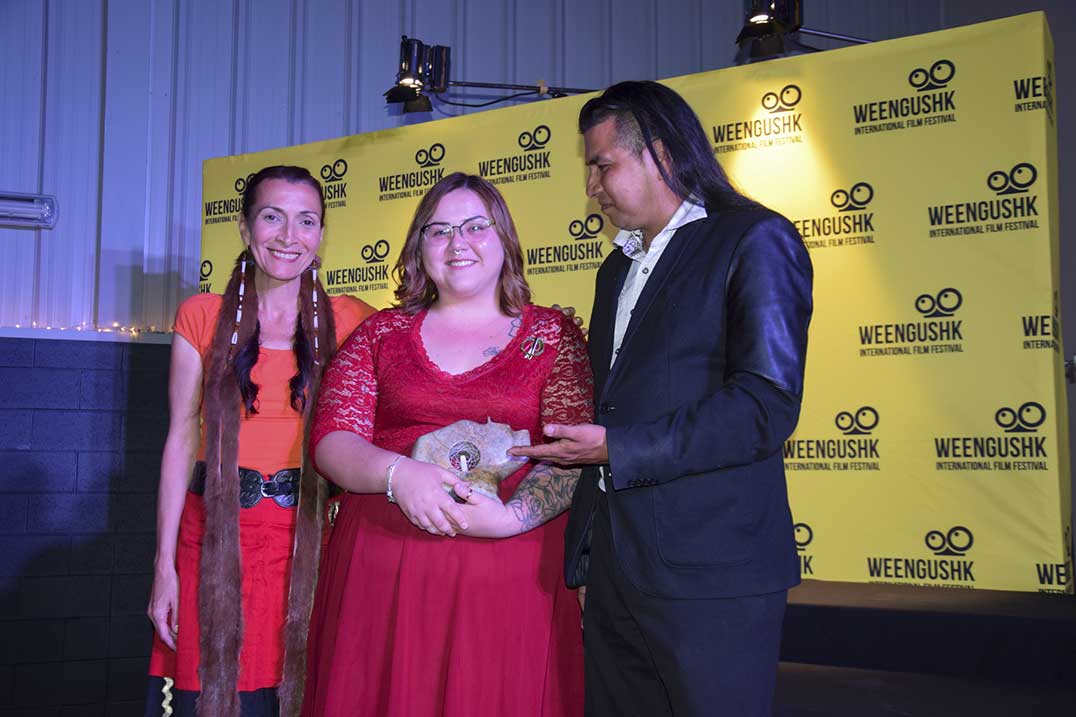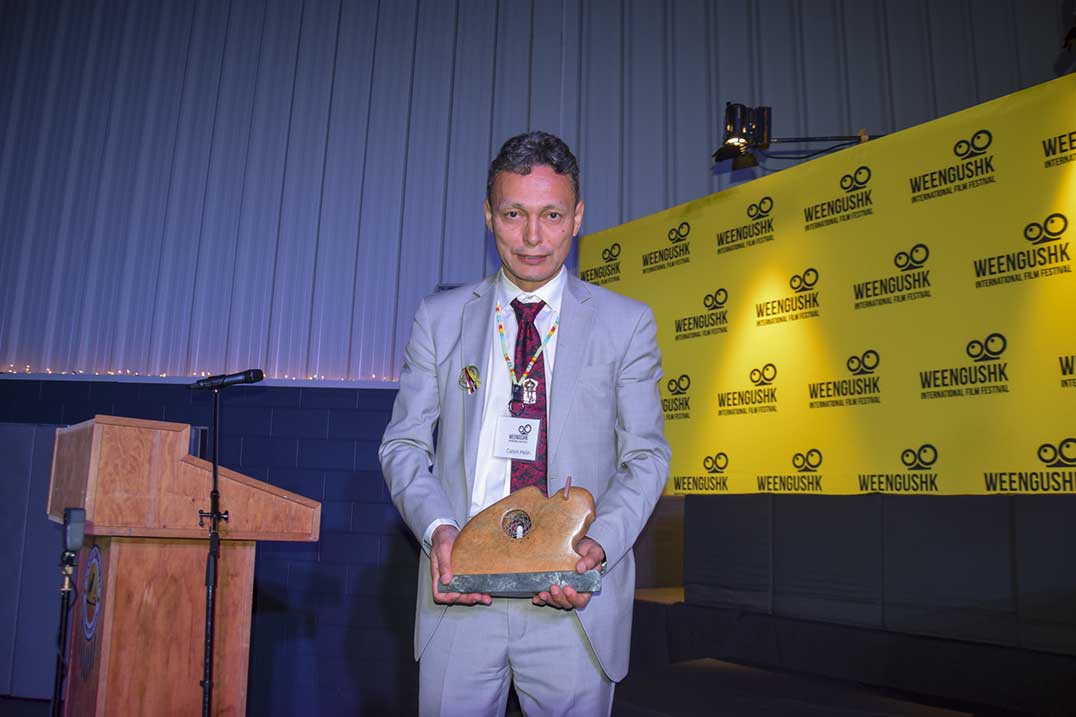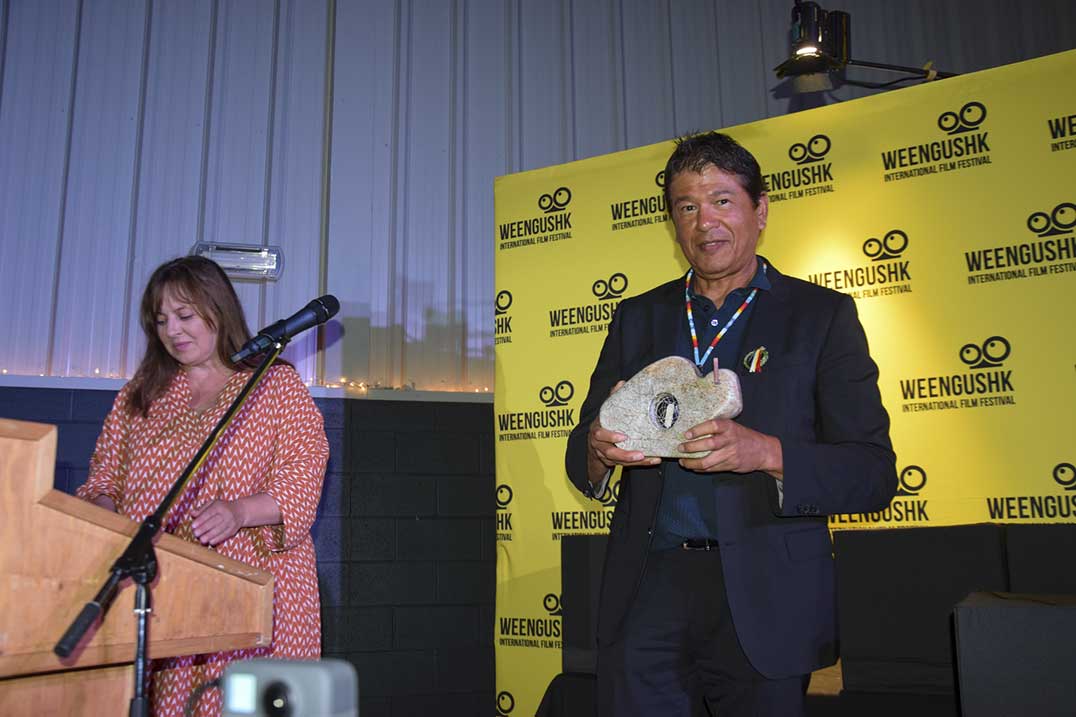AUNDECK OMNI KANING – They came, they saw, and then they watched some more. The offerings at the Weengushk International Film Festival proved addictive to most of the audience who took in the films from Indigenous communities across the globe.
The opening night ceremonies were enhanced with a dance and song performance by a visiting troupe of Maori media personalities including Peter Lucas Jones, general manager of te hiku media, a charitable media organization that belongs collectively to the Far North Iwi (tribes) of Ngāti Kuri, Te Aupouri, Ngai Takoto, Re Rarawa and Ngāti Kahu. The te Hiku Media troupe processed into Aundeck Omni Kaning’s Four Directions Complex to a welcoming song that was replied to in kind by the troupe, and gifts were presented to the Maori Indigenous relatives. In addition to performances by the Maori, the group delivered a workshop on the work being done to revive the Maori languages (several similar dialects) in their home territories (see story on page 14). Joining Mr. Lucas were Te Ikaui Kingiwaiaua, Ngawaiata Evans, Taimania Jones, John Raroa Winder, Joel Hone Bristow, Nicole Hoey and Renae Mahl.
Aundeck Omni Kaning Ogimaa Patsy Corbiere welcomed the troupe to her community’s traditional territory, recalling a visit by another group of Maoris 25 years ago, noting that the spirit of their music, dance and especially spirit of love still reverberates through the community. “Your spirit still roams in this area,” she said. “You are very loved people.”
Ogimaa Corbiere said that her community was “very proud that you are here” adding that her community has great admiration for Weengushk Film Institute founder Shirley Cheechoo and her husband Blake Debassige.
Festival organizer Kaylee Lebreton delivered a heartfelt thanks to the many volunteers and her “crew” who assisted in making the event such a success. She spoke of her time at Weengushk Film Institute as a process of “meeting my struggles. I always tried to be a perfectionist, but the film industry is not easy,” she admitted. Ms. Lebreton introduced Cree comedian Patrick Cheechoo, who was the master of ceremonies for the event.
Keynote speaker Michael Hetherington welcomed everyone to the festival and talked about the importance of Indigenous communities’ narratives and stressed the importance of reaching out to non-governmental allies, particularly during this time of rising populism in the province, noting that the first act of Premier Doug Ford’s government was to scrap Indigenous education in the Ontario curriculum.

“(Some) refer to other peoples as ‘settlers’,” he said. “I see them as human beings.”
Mr. Hetherington went on to note that “reconciliation is a difficult process,” and that if we wait for governments to build the bridges between cultures “we will be waiting for another 100 years.”
Weengushk vice president Phyllis Ellis noted that Ms. Cheechoo had taken Weengushk Film Institute from little more than an “idea and five dollars” to where it is today, with a hall filled with “actors, filmmakers, writers and sports figures.” At the conclusion of Ms. Ellis’ comments on Ms. Cheechoo, the audience in the packed hall stood for a prolonged standing ovation.
“I may have crazy ideas, but I have so many special people who help make them happen,” replied Ms. Cheechoo when the applause finally relented. “You don’t do anything by yourself. M’chi miigwetch.”
The Saturday night entertainment was in the theme of ‘Spirit of the Blues’ and featured some of the biggest names in Indigenous blues, including The Pappy Johns Band, Gary Farmer, Billy Joe Green, Vern Cheechoo, Brad Meadmore, Martin Tuesday and comedian Patrick Cheechoo on harmonica.
The Jay Switzer Fundraising Gala was a sold out event, with a number of major organizations buying full tables and many individual ticket sales. The event surpassed its goal of raising $10,000 for the Jay Switzer Memorial Bursary.

“Sometimes it can be difficult to find the right words to say about someone who meant so much to you,” said Ms. Cheechoo. “Jay was a wonderful teacher, leader, mentor and most of all a dear friend. Jay dedicated his life to the service of humanity and he is everything one could look for in a mentor. Jay’s determination, achievements, motivation, honesty, guidance and love of humanity were just a few of his qualities that continue to inspire others.”
The WIFF awards were primarily soapstone carvings created by Algonquin/Ojibwe artist Russell Noganosh. The carvings followed motifs of buffalo, bear, wolf and beaver. Each award was hidden beneath a black box onstage and the recipients were encouraged to select the box that spoke to them individually.
This year’s WIFF Humanitarian Awards were presented by Ms. Ellis to hockey legend and motivational speaker Ted Nolan and educator Calvin Helin, vice-president of Brock University. Veteran film and television actor Gary Farmer was presented with an Award of Excellence by vocal artist Crystal Shawanda.
In an emotional presentation by his mother, Rose Yesno, the Josh Yesno Tribute Award was presented to the late Michael Smith, the legendary Sioux founder of the American Indian Film Institute (AIFI), with his daughter Mytia Zavala accepting the award on behalf of her family. Ms. Zavala is following in her father’s footsteps as executive director of the AIFI.

The Clearing the Path Award was presented by Peter Lucas Jones to Nicole Hoey in surprise presentation. To bring her to the event, Ms. Hoey was told she was presenting an award to Ms. Cheechoo, her friend of 20 years.
A special award of an eagle feather and medicine bundle was presented to recent Order of Canada recipient and hockey legend Reggie Leach by Traci Loutitt and Michelle Desorier. Mr. Leach spoke on his work with Indigenous youth and the importance of kindness in life. Mr. Leach said that he channels his own mistakes in life when imparting directions to a good path to youth. “All of what I know of life is hard won,” he said.
A Special Recognition Merit Award was presented by Jonathan Zagula to Nano Debassige for his contribution to youth. The presentation was accompanied by a video tribute from current and former students.

Jury members for this year’s WIFF were Linda Wesley-Rickard, Phyllis Ellis, Dennis Landry, Brian Fowler, Gloria Panacheese and Ron Chapman.
The film awards were presented by Indigenous actors Gregory Odjig and Traci Loutitt.
Best Documentary went to ‘nipawistamasowin: We Will Stand Up’ directed by Tasha Hubbard.
Best Director also went to Tasha Hubbard.
Best Actor went to Cara Gee.
Best Film went to ‘Angeliques Isle’ with Michelle DeRosier and Marie Helene Cousineau directing.
Best Short Narrative went to ‘We’ll always have Toynbee’ directed by Sonia Boileau.
Best Student Film went to ‘Bella’ written and directed by Kaylee LeBreton.
Audio and video for WIFF was provided by Blake Debassige.

The meal was catered by Hiawatha’s Catering and included indigenous corn and black bean soup, pecan and cranberry cheese pop and wild rice, kale and pomegranate salad as an appetizer; a hearty bison or three sisters soup; a main of either maple glazed elk or fried pickerel with lemon aioli; and a dessert of maple walnut cheesecake with Canadian bacon.
With a weekend filled with laugher and many, many hugs, WIFF 2019 was a delight for all of the senses.




